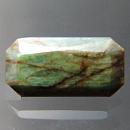|
Click on a letter above to view the list of gems. |
|
|
|
|
|
|
|
|
Johannsenite
|
|
| | |
| Discovered in 1932; IMA status: Valid (pre-IMA; Grandfathered) | ||
|
| ||
|
Chemistry |
|
|
| |
|
CaMn2+(Si2O6) | |
|
|
Calcium Manganese Silicate |
|
Molecular Weight: |
247.18 gm |
|
Composition: |
Calcium |
16.21 % |
Ca |
22.69 % |
CaO |
|
|
Manganese |
22.23 % |
Mn |
28.70 % |
MnO |
|
|
Silicon |
22.72 % |
Si |
48.62 % |
SiO2 |
|
|
Oxygen |
38.84 % |
O |
|
|
|
|
|
100.00 % |
|
100.00 % |
= TOTAL OXIDE |
|
|
|
||||
|
Classification |
|
|
| |
|
Silicates (Germanates) | |
|
8/F.01-70 | |
|
|
9 : SILICATES (Germanates) |
|
Related to: |
Pyroxene Group, Clinopyroxene Subgroup, Hedenbergite-Johannsenite Series, Diopside-Johannsenite Series |
|
Varieties: |
None |
|
Synonyms: |
None |
|
|
|
|
Crystal Data |
|
|
|
|
|
As prismatic crystals, to 10 cm. In columnar, radiating, and spherulitic aggregates of fibers and prisms. |
|
|
Simple and lamellar twinning common on {100} |
|
|
|
|
|
Physical Properties |
|
|
|
|
|
Good on {110}, (110) ^ (110) ~87°; partings on {100}, {001}, and {010} |
|
|
Uneven to Conchoidal |
|
|
Brittle |
|
|
6.0 |
|
|
3.27 - 3.54 (g/cm3) |
|
|
None |
|
|
Not Radioactive |
|
|
|
|
|
Optical Properties |
|
|
|
|
|
Blue-Green, Greenish, Gray, Clove-Brown, Colorless; Colorless in thin section. |
|
|
Translucent to Opaque |
|
|
Vitreous |
|
|
1.703 - 1.745 Biaxial ( + ) |
|
|
0.0290 |
|
|
Weak to Moderate; r < v or r > v |
|
|
None |
|
|
|
|
|
Occurances |
|
|
|
|
|
Geological Setting: |
In metasomatized limestones and manganiferous skarns; in quartz or calcite veins cutting rhyolite. |
|
Common Associations: |
Rhodonite, Manganese Oxides |
|
Common Impurities: |
Ti, Al, Fe, Mg, Na, K, C, P, H2O |
|
Co-Type Localities: |
Temperino Mine, Temperino, Campiglia Marittima, Livorno Province, Tuscany, Italy
|
|
Year Discovered: |
1932 |
|
View mineral photos: | |
|
|
|
|
More Information |
|
|
|
|
|
| |
|
|
|
|
Sources
of Johannsenite include Tetela de Ocampo, Puebla,
and Pachuca, Hidalgo, Mexico. In the USA, at Franklin,
Sussex County, New Jersey; from the Bohemia district,
Lane County, Oregon; at the Aravaipa district, Graham
County, Arizona; and in the Empire Zinc County mine,
Hanover, Grant County, New Mexico. From Civillina Mt., Recoaro Terme, Vicenza Province, Veneto, Italy.
In the Akatani mine, Niigata Prefecture; the Nakatatsu
mine, Fukui Prefecture; the Onagusa mine, Katsuyam,
Okayama Prefecture; and elsewhere in Japan. In the N'Chwaning Mine, Kalahari Manganese Field, Northern Cape Province, South Africa.
A number of other localities are known. |
|
|
We
have not photographed our Johannsenite gems. Please
check back soon. |
